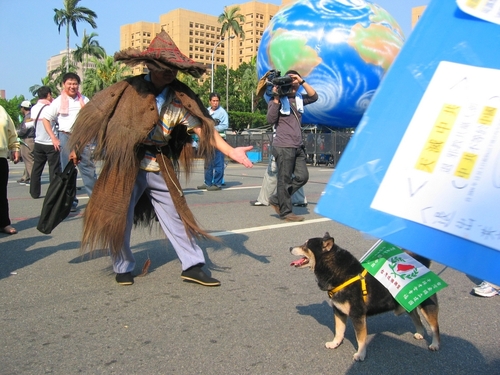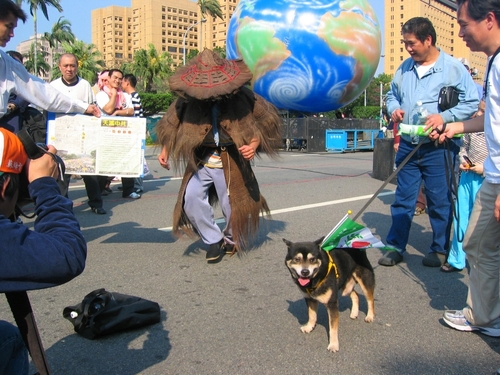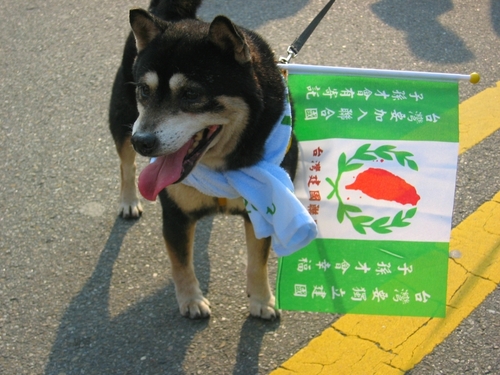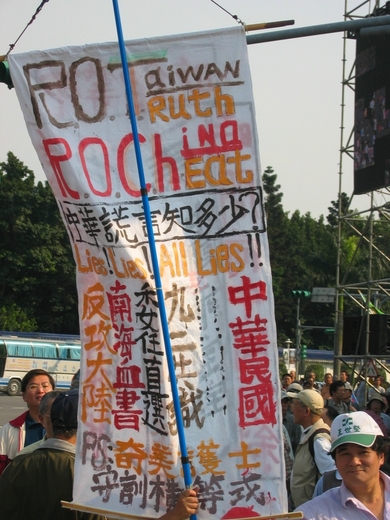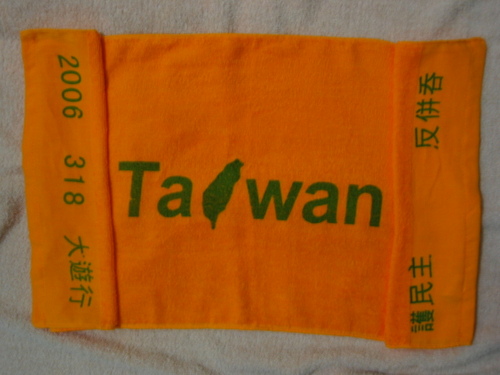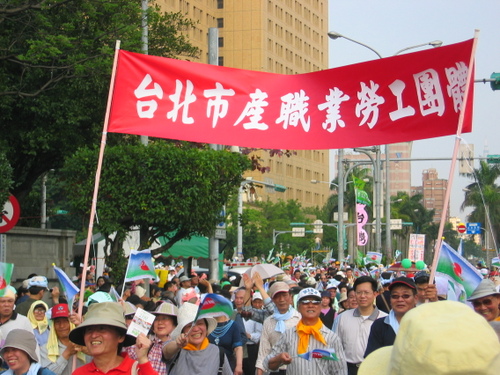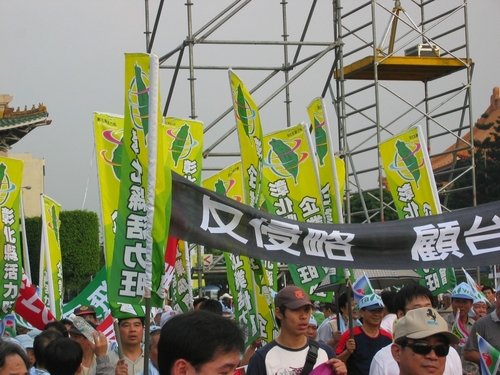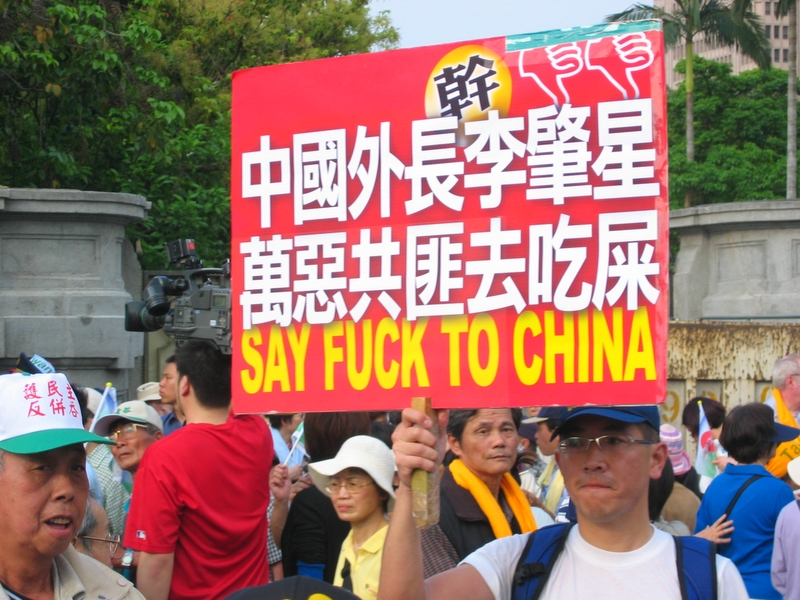"I would much rather have men ask why I have no statue than why I have one."
– Cato the Younger (95-46 B.C.)
Sometimes when you procrastinate blogging about something, the issue ends up going away before you get a chance to write about it. On the surface, the March 18th proposal to remove Chiang Kai-Shek and Chiang Ching-Gwoh statues from Taiwanese military bases looks like just such an issue. Not a day had passed before the Ministry of National Defense busied itself trying to mollify KMT outrage by assuring everyone that only worn-out fiberglass statues would be permanently removed. The KMT was left unappeased however, and by March 22nd, even this compromise plan was dead in the water.*

(Chiang Kai-Shek image from Wikipedia.)
So, no issue, no post, right? Move along folks, there’s nothing to see here…
Except that the issue really ISN’T dead. In response to the KMT’s statue victory, President Chen on March 25th renamed Taipei’s version of the White House from the clunky "Long Live Kai-Shek Hall" to the terse "Presidential Office". In doing so, he was obviously of the belief that a building should named after the function it serves, rather than after the dictator who once happened to work there. At any rate, more marginalization of Chiang-era monuments is almost certain to happen in the future if Taiwan’s democracy is allowed to mature. Actually, I’ll go even further to suggest that that Chiang statues will someday be discarded, REGARDLESS of democracy’s fate in Taiwan. More on this though, later in the post.
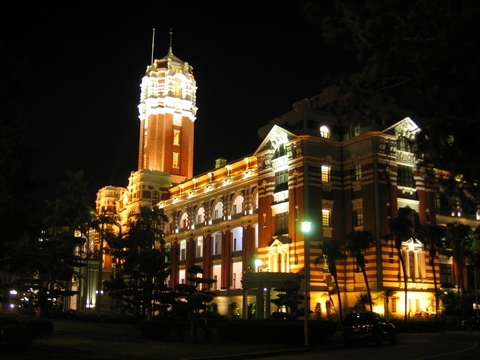
(Presidential Office image by The Foreigner)
One of the main objections that the KMT have to Chiang iconoclasm is that they say it smacks of the Chinese Cultural Revolution. Mao’s Red Guards wanted to eliminate traces of a past they didn’t like, and those who would remove the Chiang statues want to do exactly the same thing. President Chen is therefore a modern Maoist madman, QED.
The fundamental difference that they overlook however, is that the Taiwanese State is behaving entirely within constitutional limits. There are no coercive extra-legal groups entering institutions and private homes to destroy Chiang relics. Children are not being encouraged to inform on their parents. There is no violence being used to achieve the goal. Members of the independence party spent time in the Chiang’s political prisons for advocating democracy, and asking them to be grateful to the generalissimo and his son at this stage is asking a little much. Free men do not typically glorify those responsible for freedom’s suppression.
The other thing that they overlook is that Chen’s actions, unlike Mao’s, have democratic legitimacy. I’m unaware of any polls on the issue, so I don’t know the level of public support for removing Chiang statues. But I DO know that Chen was democratically elected, so he at least has the CONSENT of the people. Surely the Taiwanese people knew after electing the head of an independence party TWICE to the presidency that he would carry out at least some of the more symbolic aspects of the party platform. If a member of a reunification party is someday elected, I fully expect him to undertake opposing measures. That’s the way democracy works.
I will agree with the KMT that iconoclasm can be taken too far, and sometimes, it is. Great are the efforts being taken today in certain quarters to transform America’s Columbus Day into a day of sackcloth and ashes. Feminist preoccupation with gender neutral language can border on self-parody. And reversing the L.A. county commissioners’ decision to remove the tiny cross from the Spanish mission on the county seal has become something of a conservative cause celebre. The argument that we shouldn’t erase our past just because we aren’t entirely happy about it is one that I do take seriously. Up to a point, anyways.
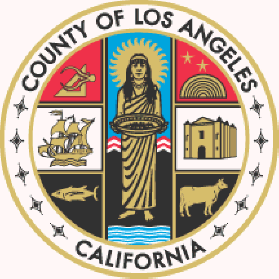
Sometimes however, iconoclasm is entirely appropriate. I can recall years ago a communist, er, columnist from my hometown’s daily newspaper lamenting the changes in Russia after the fall of the Soviet Union. Her protests then were similar to the KMT’s today. You Russians were Bolsheviks, she said, and you ought to be proud of your wonderful history. You fought and beat the Nazis. Your collectivist system has given you wonderful social programs. Leave all of your communist-era statuary standing so that future generations can be inspired by the marvelous accomplishments of your magnificent Revolution.
And so on.
I had no blog back in those days, so I’ll respond to that columnist now. Madam, your line of thinking, and the KMT’s, concedes entirely too much to tyrants; it allows them to rename St. Petersberg to Leningrad, but in the name of preserving history, doesn’t permit democrats to do the reverse. It’s not cricket that a megalomaniacal caudillo can plaster every spare wall in a country with portraits of his ugly mug, while his democratic successors are left responsible for their care and upkeep.
Even if you believe that SOME statues of the generalissimo should remain as a matter of giving history its due, the question should be: How many are really needed to perform this function? The China Post last week had a picture of a courtyard containing at least six busts of Chiang Kai-Shek that I could count. There may well have been more outside the camera’s field-of-view. Having six busts of one man in a single place isn’t an example of a decent nod in history’s direction – it’s deification. It’s allowing the dead hand of a dictator to continue ruling from beyond the grave.
It should be stated that Chiang Kai-Shek was no Hitler or Stalin, and that Taiwan was much better off under him than it would have been under Mao T’se Tung. Still, to say that Taiwan’s deceased president wasn’t a Mao or a Stalin is hardly anything to brag about, and it’s not a particularly compelling argument to make in favor of retaining his monuments. To pull down statues of a man like Thomas Jefferson because he had feet of clay would be an act of historical vandalism. Pulling down statues of a strongman who sent Taiwanese to political prisons doesn’t quite fall into the same category.
Ultimately, the Chiang memorials will probably meet with the fate of monuments to another generalissimo: Francisco Franco.** Most of Franco’s statues have been removed slowly over time, but a few still stand here and there throughout Spain. I hope they aren’t destroying the ones they take down, and put them instead into museums. The Russians had a great idea where they crammed all of the communist statues from the entire Soviet Union into one park in a Moscow suburb. To me, that would be poetic justice – leaders so devoted to their own self-aggrandizement should have a single park devoted solely to their egotism, as a sort of cautionary example.
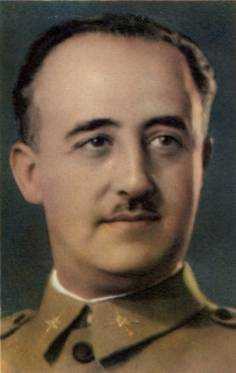
(Francisco Franco image from Wikipedia.)
There are a few other arguments I’ve heard in favor of keeping the statues, but I’ll have to discuss them in some other post some other time. What we CAN expect is that the KMT will to fight to the last to protect its symbols from Taiwan’s independence parties. As I’ve outlined, I think they’ll lose the historical battle as democracy entrenches itself further in Taiwan. But what if democracy doesn’t grow stronger? What if the KMT embraces the Chinese Communists, and they manage to pull the country into Beijing’s orbit? What would happen to the statues in Chinese Vichy?
I suspect that their fate would be EXACTLY THE SAME. Communists can be relied upon to twist arms to remove images of men who are symbols of resistance to their rule. Statues of such men might someday inspire men to rebel, and that cannot be permitted. Americans may tolerate Confederate monuments on Southern soil, but the Communist Party of China is not nearly so magnanimous.
Given the recent crop of KMT leaders, I don’t see the modern KMT offering anything more than token resistance, either. The KMT’s recent behavior suggests that they’re perfectly willing to sell their souls and jettison their most beloved symbols in order to curry favor with the Communist Party of China. I offer this as but one example.
Ironic, isn’t it? When the independence parties want Chiang Kai-Shek statues removed, the KMT deride it as an act of historical vandalism. But should the Communist party of China ever call for their removal, watch how swiftly the KMT hail the move as a pragmatic act of reconciliation!***
If you’re still unconvinced, then consider the additional pressure that will come when large numbers of Chinese tourists begin visiting Taiwan. Reflect for a moment upon the grief that Taiwanese businessmen routinely get from pushy Chinese delegations when they try to display ROC flags at product conventions around the globe. Now, just imagine a MILLION Chinese tourists coming to Taiwan each year – a good portion of them stamping their feet and whining about Chiang statues and ROC flags and God knows what else. I’ll bet that a lot of those complainers are going to loudly announce to their tour guides that they’ll never come back, and they’ll threaten not to recommend Taiwan as a travel destination to the folks back home unless "provocative symbols" are removed from sight.
At that point, the KMT will face a choice between principle and pragmatism. Is it the Generalissimo…or the customer, who is always right?
* Or was it "suspended"? "Abolished"? Or has it just "ceased to apply"…
** "Despite Franco’s death and an expected burial tomorrow, doctors say the dictator’s health has taken a turn for the worse." – Chevy Chase
*** If the KMT eventually abandons Chiang Kai-Shek because he serves as an anti-communist symbol, I wonder if Taiwan’s independence parties might not someday adopt him for that very same reason? I don’t think it’s probable, but people with a cause sometimes pick the unlikeliest of people to be their heroes…
i-4




